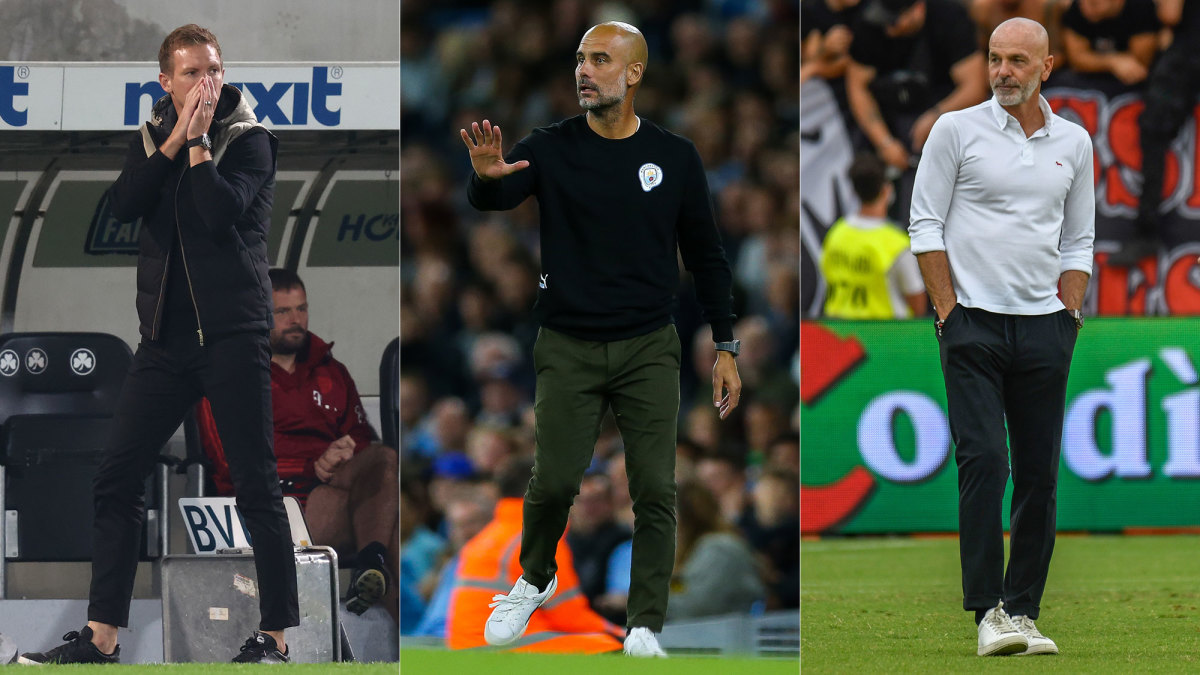Three Successful Managers, Three Awful Ideas

Football is an inherently conservative sport. It has changed remarkably little since the laws were first codified in 1863. There was a period of radical change in the early 90s with the coming of the Premier League and the Champions League, both of which ultimately led to the further enrichment of the already rich. There were simultaneous changes to the laws to respond to the perceived negativity of the 1990 World Cup: The outlawing of the backpass that goalkeepers could handle, the liberalization of offside and the crackdown on intimidatory tackling.
Whether it was intended or coincidence, the effect was to make football more entertaining, a better spectacle, which increased television audiences—and thus revenue—and hastened the process of financial stratification provoked by the changes in tournament format. Thirty years on, it feels that football is at a similar point of flux. Not only are there almost weekly suggestions of changes to existing competitions or their frequency, but in the past couple of weeks three coaches have suggested seismic changes to the game. And all are just different degrees of terrible.
Let’s take them in order of absurdity. Julian Nagelsmann, the 34-year-old at the helm of Bayern Munich, suggested that a player (or players) should be fitted with an earpiece to aid communication with his coach. From a theoretical point of view, it is not a bad idea. Leeds United’s players this season have suggested their drop-off in form has been in part caused by the difficulty of communicating in a packed and noisy stadium, and football at the highest level, at least beyond the celebrity signings, is about increasingly complex systems of pressing. The appeal for a coach to be able to guide and finesse those structures is clear.
"American football is much more technologically advanced than soccer. The quarterback has an earpiece to hear his coach; we absolutely need that. Football must stop hiding behind tradition and revolutionize itself," Nagelsmann recently told German outlet TZ, following a virtual meeting with Kansas City Chiefs coach Andy Reid.
But realistically, how would it work? How could a player wear an earpiece without it becoming dangerous when heading the ball? This is not like NFL or cycling in which the participants wear helmets that can accommodate earpieces. It may be that heading ultimately is banned in football but, for now, the idea is simply unworkable.

Then there was Pep Guardiola’s plan for Manchester City’s under-23 side to play in the lower flights of English football. Occasionally he pays lip service to the great traditions of English football, but here his true feeling was exposed. It’s only been 22 years since Manchester City was one of those sides in the third flight, and yet he would now destroy the integrity of the lower leagues, ruin the existence of clubs that have existed in many cases for a century and a half, essentially because his club is now so big that it has an excess of players.
Nobody is denying that there is a problem in finding a way to give talented young players pitch time. The superclubs do have an issue with stockpiling talent (which is why Chelsea loaned out 37 players last season). But the problem is that those clubs are too big already. They could solve the problem by simply not signing so many players. Making them stock a U-23 side would only increase their rosters and give them an even greater advantage.
"They should play every day teams like Championship or League One," Guardiola said in his pitch, timed around City's rout of Wycombe Wanderers in the League Cup. "That will be the best ever for English football. For English football that would be the best. Not playing against these players 17, 18, 19 years old they win 4–0, 5–0, 6–0, 7–0 every single day. This is not—we can not educate them. That is not good for them."
The cost, meanwhile, would be immense: There is no incentive for a U-23 side, which wouldn’t be promoted into the top two divisions, to take every game equally seriously. And admitting Premier League U-23 sides into League One and League Two would obviously mean 20 sides in League One and League Two being pushed down a level. Why should they suffer? Why should their route to the Championship, or even to playing the bigger League One sides, be diminished for the greed of an elite few? Football should not just be about the oligarchs.
But still, Guardiola’s idea at least makes sense from the point of view of an extremely blinkered and self-interested manager with no capacity for empathy. The suggestion of AC Milan manager Stefano Pioli that teams should not be allowed to go back into their own halves once they’ve crossed the halfway line makes no sense whatsoever.
"If we want to see more attacking football in the modern game, bring in a rule where you can’t go back into your own half once you’ve crossed the halfway line,” Pioli said, accompanying other ideas such as stopping the clock when the ball goes out of bounds.
It’s such a bizarre idea it’s difficult to believe he was serious. The move would, very obviously, have the opposite effect to that he claims it will, which is to promote attacking play. The team out of possession could simply drop back into its own half, safe in the knowledge an opponent would not be able to create space by going backward to switch play. There would be no possibility of playing the ball back to a man in space in his own half, to launch a quick forward pass. It would actively cut down attacking options and make defending easier.
If these are the best suggestions for development, football’s conservatism is probably a very good thing.
More Soccer Coverage:
